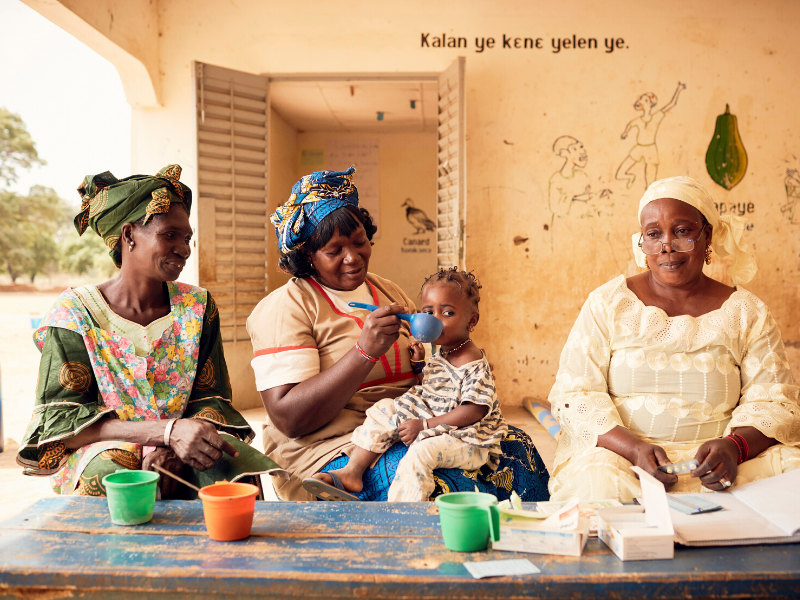Over the past five years, TDR has been a key partner in the Optimizing Seasonal Malaria Chemoprevention (OPT-SMC) project, which has recorded many success stories and lessons learnt that will be useful for new efforts to improve implementation and uptake of malaria vaccines.
Despite efforts to reduce the burden of malaria, nearly 600 000 people died of malaria in 2023, and one in every five of those deaths were in children under five. Therefore, it is essential that countries continue to optimize life-saving malaria prevention interventions such as seasonal malaria chemoprevention (SMC).

A woman in Mali gives antimalarial medicine to a child. Credit: Mali National Malaria Programme
The OPT-SMC project, which concludes this month, was developed to strengthen the capacity of national malaria programmes in conducting implementation research to tailor SMC to the local context, ultimately improving its delivery and impact. With funding from the European and Developing Countries Clinical Trials Partnership (EDCTP), grants and technical assistance were provided to support 13 countries across West Africa and Central Africa – namely Benin, Burkina Faso, Cameroon, Chad, The Gambia, Ghana, Guinea, Guinea-Bissau, Mali, Mauritania, Niger, Nigeria, Senegal and Togo – to enable the implementation of projects and facilitate the sharing of information and expertise.
In partnership with the University of Thiès in Senegal, the Special Programme for Research and Training in Tropical disease (TDR), Medicines for Malaria Venture (MMV), and the London School of Hygiene and Tropical Medicine (LSHTM), these countries conducted implementation research focused on: understanding community perceptions of SMC; improving the coverage and quality of SMC delivery; identifying the facilitators and barriers to SMC uptake; and strengthening monitoring and evaluation systems. The project helped the national malaria programmes (NMPs) to effectively target high-risk populations and create a platform for knowledge and experience sharing among the implementing countries.
Most NMPs used research findings to adapt their practices. For example, in Nigeria, research revealed the importance of strengthening communication about the safety and effectiveness of SMC to caregivers and their preference for receiving SMC at home. In Burkina Faso, the NMP was able to increase coverage of SMC in the country’s two largest cities by improving the mechanism for mobilizing community healthcare workers and reinforcing the knowledge of SMC within the community.
Beyond the results gathered from the projects themselves, the NMPs testified that the OPT-SMC project has helped them improve their research capabilities. As a byproduct of the project, some countries were also able to develop a database for capturing research evidence. They were equally very pleased to learn from other implementing countries and apply their lessons learnt.
Findings from the project have been disseminated at key international conferences, including the American Society of Tropical Medicine and Hygiene (ASTMH), 8th Multilateral Initiative on Malaria (MIM) Society Conference and the EDCTP Forum.
The strong network and momentum created by the OPT-SMC project will serve as a solid foundation for the next chapter: the Optimizing Malaria Vaccine Uptake (OPT-MVAC) project, which aims to optimize the delivery and uptake of malaria vaccines in countries with areas of highly seasonal transmission in West and Central Africa.
As we look ahead, the lessons of OPT-SMC remind us that impactful change happens when countries lead, collaborate and innovate together in the fight against malaria.
For more information, please contact Dr Corinne Merle.

